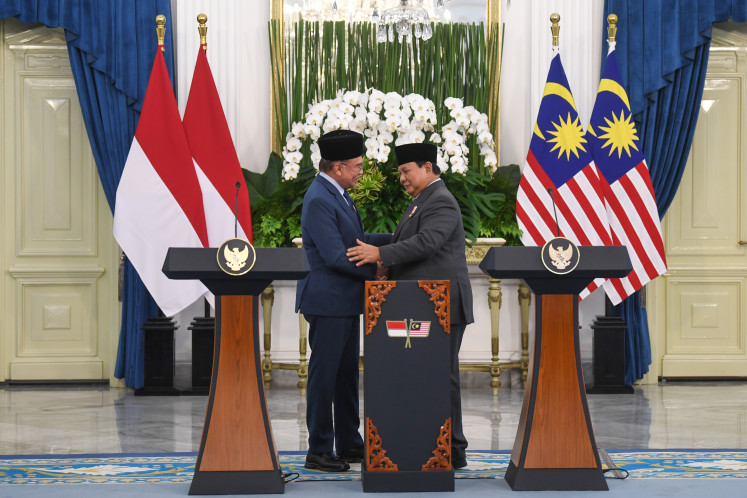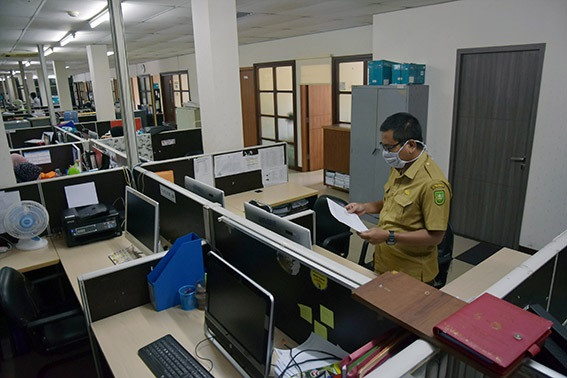Popular Reads
Top Results
Can't find what you're looking for?
View all search resultsPopular Reads
Top Results
Can't find what you're looking for?
View all search resultsCommunists: Not necessarily atheists
Some people have tried to exploit the issue of the ghost of the more than 50-year-old defunct Indonesian Communist Party (PKI)
Change text size
Gift Premium Articles
to Anyone

S
ome people have tried to exploit the issue of the ghost of the more than 50-year-old defunct Indonesian Communist Party (PKI). One of the narratives to make the ghost more frightening is that communists are atheists, suggesting that they have no place in Indonesia based on Pancasila, the first principle of which is Belief in God.
It was also the main reason why the New Order’s 1985 law on mass organizations declared communism/Marxism-Leninism in contradiction of Pancasila. This provision is still retained in both the 2013 Law on mass organizations and its revised version, the government regulation in lieu of law (Perppu), which was enacted last July.
In theory, that narrative has some truth. Defined exclusively as that of classical Marxism, communism is a political ideology that is atheistic, if not anti-religion. One of the main tenets of Marxism is economic determinism: the “base” or the economic factors (one’s relation to the means of production) determines the “superstructures” (ideology, politics, legal system, culture, religion, etc.). The superstructures will change or disappear depending on the evolutionary interplay among the economic factors.
Communism sees religions as just “expressions of historical stages of development of peoples.” In the communist, classless society, the last stage of that development, it is dreamt that religion will disappear because it has become unnecessary as the bourgeois class that benefits from religion being “the opium of the masses” no longer exists. After all, the Communist Manifesto said communism “abolishes all religion.”
Yet the Indonesian case (and that of many other Muslim-majority countries) tells a different story from what is supposed. Many of Indonesia’s leading advocates of Marxism were Muslims.
At the Fourth Congress of Communist International in 1922 which discussed “the struggle against Pan-Islamism,” where Tan Malaka, the Murba Party’s founder, made a speech (in which he said he was a Muslim) promoted an alliance between communists and pan-Islamists instead, considering the context of the then East Indies which shared the anti-imperialist agenda. The pan-Islamist movement he referred to was Sarekat Islam (SI), chaired by HOS Tjokroaminoto.
Tjokroaminoto, a teacher of Sukarno (nationalist), Semaoen (communist) and Kartosoewirjo (an Islamist), wrote a book titled Islam dan Sosialisme in which he said that Islam too opposes capitalism and promotes socialist principles. He added that the Marxist concept of “surplus value” (that which is appropriated by the owner of the means of production by exploiting laborers) is the same as riba (usury) which is sinful in Islam.
Sukarno cited Tjokroaminoto’s thoughts in his famous 1926 piece titled Nasionalisme, Islamisme, dan Marxisme encouraging unity of these three major forces of the independence struggle movement. In it, Sukarno also said that rejecting an alliance with nationalists and Islamists was an “outdated Marxist strategy.” Sukarno argued that Marxists should rethink the Communist Manifesto’s stance on religion, arguing that it was responding more to European churches.
Another prominent communist Muslim figure in SI was known as Haji Mohammad Misbach. When joining Tjokroaminoto’s Tentara Kandjeng Nabi Mohammad (Prophet Muhammad’s Army), he condemned a journalist whom he said had insulted the Prophet and challenged him to a public debate in 1918, which was attended by thousands of people.
Misbach stated that Islam opposed capitalism and imperialism, and that communism could serve as its powerful weapon. When SI split into the White SI (led by Tjokroaminoto) and the Red SI (led by Semaoen and later became the PKI), Misbach joined the Reds. Because of his aggressive critiques the colonial government exiled him to Papua.
The communists were seen as “radical” by the colonial government, especially after the 1926 communist revolt in Banten. In the eyes of the Dutch, the radicals were those unwilling to negotiate and compromise with the colonial government. Many involved in that 1926 revolt were haji. They were eventually exiled to Boven Digoel, and some later joined Tan Malaka’s Murba Party.
In short, during the independence struggle, communists and many Muslims fought side-by-side. Muslims did not see a problem in advocating Marxist teachings.
The issue of incompatibility between Islam and communism became prominent after the 1948 Madiun Affair where the People’s Democratic Front (in which the PKI was a major group) rebelled against the Republican government that wanted to implement the Renville Agreement signed with the Dutch.
Although immediately crushed, the PKI was still able to regroup and grew bigger instead, finishing forth in the 1955 general election behind the Indonesian National Party (PNI), Masyumi and Nahdlatul Ulama (NU).
In the Constituent Assembly, which was writing a new constitution, the most heated debate was over the state foundation. The parties were divided into three groups: Pancasila, Islam and Social Economy. Surprisingly, the PKI was not in the Social Economy group, which was comprised of mostly small parties.
The PKI allied itself with PNI in the Pancasila group against Masyumi and NU in the Islam group. These two groups dominated the debate which went unsettled for four years, resulting in the Assembly’s dissolution in 1959 by Sukarno.
The election result tells one important point: PKI voters could not all be atheists. By supporting Pancasila, they knew they must accept the first principle although they previously proposed “religious freedom” to replace it.
It also ironic: while they worked hard to accept Pancasila, even being accused of hypocrisy by Islamists in the Assembly, they were later declared by the New Order to have betrayed Pancasila.
The history of Islam and communism in Indonesia didn’t run according to what may have been theoretically conceived.
More than ideological, it is the changing configuration of power that shaped their relationship. And it cannot be reduced to the statement that communists were atheists.
_________________________
The writer holds an MA degree from the Center for Religious and Cross-cultural Studies (CRCS), Gadjah Mada University, Yogyakarta.









